The New Jersey Devils surprised many when they announced Lindy Ruff would take over as the team’s next head coach. Before then, he served as an assistant coach overseeing the New York Rangers’ defense and penalty kill. He was also the Dallas Stars’ head coach from 2013-17, where he got the team to the playoffs twice in four seasons.
There’s been plenty made over the Rangers’ defense and penalty kill under Ruff, as it’s been one of the worst in the league over the last three seasons. The Stars’ defense, although not the worst in the league, was nothing to write home about, either.
But if we focus on Ruff’s tenure with the Stars, he managed to build some powerhouse offenses. They played an up-tempo, high-event style of hockey, and got the most out of star players like Tyler Seguin and Jamie Benn. Ruff also played a significant role in turning John Klingberg into one of the top puck-moving blueliners in the NHL. And those performances give optimism that some Devils should benefit from Ruff’s hiring.
Jesper Bratt
Bratt’s had his ups and downs since making his NHL debut in 2017-18, though none of them top what he went through in 2019-20. He had seven points in his first 21 games and was a healthy scratch on a couple of occasions. When he did play, he spent a good amount of time on the fourth line alongside Kevin Rooney and Nikita Gusev.
But things changed when the Devils fired John Hynes and named Alain Nasreddine as the interim coach. They started playing at a much faster pace, and Bratt began to benefit from more top-six minutes. He had 25 points over his last 39 games, a 53-point pace over 82 games, and became one of the team’s best two-way forwards.
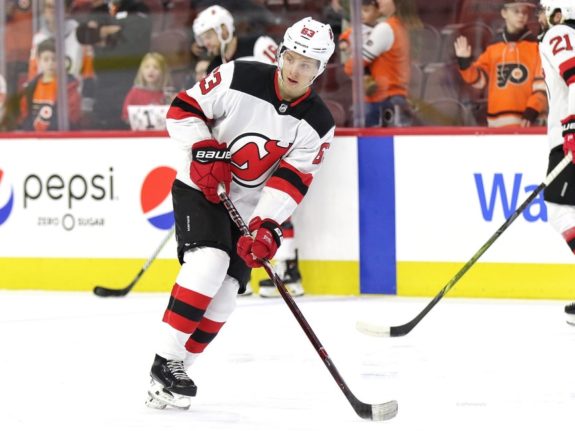
Since Ruff also plans on playing a fast-paced system, Bratt should be one of the biggest beneficiaries. He’s one of the Devils’ quickest and most-skilled wingers and should find himself in a top-six role under Ruff as he did under Nasreddine. If that’s the case, he could find more consistency and a breakout season where he finally tops 50 points could be on the way.
P.K. Subban
When the Devils acquired P.K. Subban at the 2019 Draft, the hope was he could help turn around a miserable defense. As it turns out, that never came close to happening. He finished with a career-worst 18 points in 68 games. His goals above replacement (GAR) of minus-10.1 was tied with Johnny Boychuk for worst in the league for any defenseman.
There’s no way around it, Subban was not any good in his first Devils’ season. And unlike Bratt, a reduced role seems best for the veteran defenseman. Fortunately, the system Ruff plans on implementing could help Subban regain some of his form.
Ruff likes to get his defensemen involved in the attack by having one be the fourth player to jump in on the rush. It’s something he did with the Stars to great effect — Trevor Daley and Alex Goligoski had the best seasons of their career playing for Ruff and the Stars. Ruff also helped bring along Tony DeAngelo and Adam Fox in their development with the Rangers. So even though their team defense was a mess, their blueliners were active in making an offensive impact.
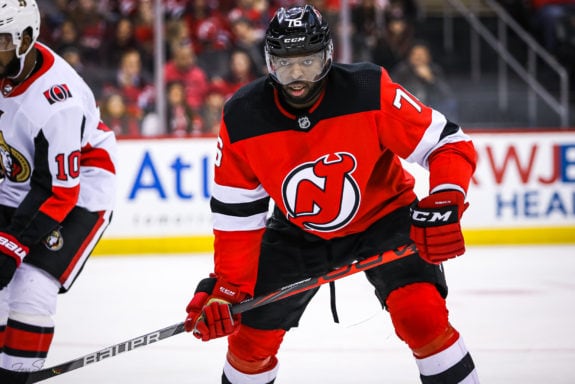
Will playing like Klingberg or Fox did under Ruff help Subban recapture his past success? There’s no doubt Ruff will try and get him to jump in on the rush more often, so he should have a more positive impact offensively. The Devils were hoping for more than that when they acquired him. But if playing an offensive role with softer minutes helps him get going, they’ll gladly take it.
Nikita Gusev
Gusev’s 2019-20 was his first in the NHL after spending multiple years tearing up the KHL. He struggled in the first part of the season and had 12 points in his first 23 games. Like Bratt, he was a healthy scratch on occasion and found himself playing on the fourth line more often than not.
But when the coaching change occurred, Gusev’s game took off. He totaled 32 points in his last 43 games while firing 101 shots on goal. Once games came to a halt due to COVID-19, he stood as one of the league’s most efficient five-on-five scorers for the season. His average of 2.20 points per 60 minutes (points/60) ranked 50th among forwards with 500 or more minutes played. It also placed him ahead of other top scorers like Teuvo Teravainen, Filip Forsberg, and Mitch Marner.
Related: Devils Being Rewarded for Gusev Gamble
Much like Bratt, Gusev will benefit from Ruff’s offensive system. He produced at a 61-point pace over his final 43 games and found chemistry with Bratt and Pavel Zacha. He’s arguably the team’s best passer and has incredible hockey I.Q. Assuming he’s in a top-six role, which seems likely, a 60-70 point season for the Russian winger is not unreasonable.
Jack Hughes
Hughes had a disappointing rookie season after being the first overall pick at the 2019 Draft. He finished with 21 points in 64 games, the lowest total for a first overall pick since 1999-00, when Patrik Stefan finished with 25 points in 72 games.
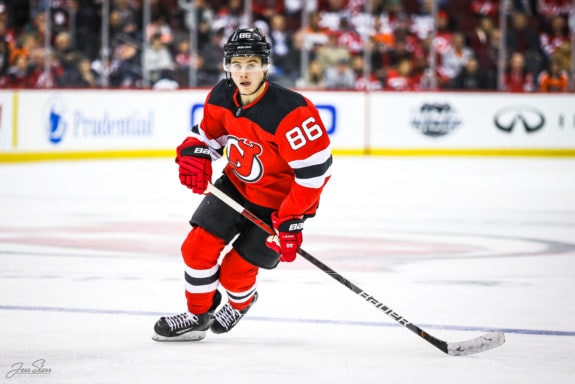
But although his rookie season was worse than expected, not all the blame falls on him. Aside from a stint with Taylor Hall and Kyle Palmieri early in the season, where Hughes played his best, he never was placed in a position to succeed. His most common linemates were Wayne Simmonds and Zacha or Miles Wood. With all due respect to them, they’re not skilled enough to be playing alongside someone like Hughes. There was also Nasreddine’s experiment with Hughes on the wing, which was a disaster — he had a Corsi share (CF%) of 39.29%, and expected goals share (xGF%) of 41.04% in 11 games.
When the Devils introduced Ruff, he spoke about how playing Seguin in the right role, with the right linemates, contributed to him becoming a star player with the Stars. That’s not to say Hughes will become an 80-point player next season. But those words have to be music to his ears. If he has two capable scoring wingers around him, as he should, he likely takes a significant step forward as a second-year pro.
Nico Hischier
Hischier had a terrific rookie season in 2017-18, finishing with 20 goals and 52 points in 82 games. He totaled 47 points in 69 games in his second season, a 55-point pace over 82 games. Due to the stoppage of play from COVID-19, and some injuries, he played in only 58 games this past season. But his production was about the same, as he scored at a 51-point pace over 82 games.
Hischier has been remarkably consistent in his first three NHL seasons. But there’s another level to his game that’s yet to be unlocked. Since coming into the league, he’s averaged 2.04 points/60, ranked 67th out of 393 forwards with 1000+ minutes at five-on-five. That places him ahead of Mika Zibanejad, Jamie Benn, and Blake Wheeler, to name a few.
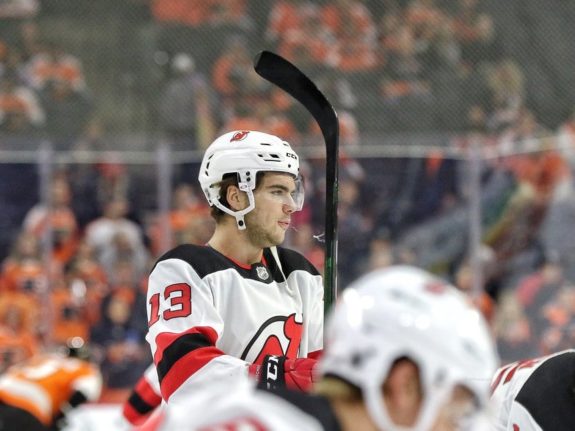
The breakout potential is there for Hischier. Seguin is also a pretty good comparison for Hischier, even more so than Hughes. Before joining the Stars, Seguin had a few solid seasons with the Boston Bruins, where he averaged 49 points per 82 games. But the consistent 70-80 point seasons didn’t come until he played for Ruff.
I’m not sure Hischier will ever be an 80-point center, but consistently finishing around 70 points is not out of the question. Much like Hughes, Ruff will look to place Hischier in the right role with scoring wingers around him. And given the new system will emphasize pace and puck possession, a spike in his scoring would be a smart bet.
Will Butcher
Butcher also had a terrific rookie season in 2017-18, finishing with 44 points in 81 games. His production slipped in 2018-19, but his underlying numbers were still in good shape. That changed in 2019-20, and it wasn’t an insignificant dip in play — his GAR dipped from 13.1 a year ago to 4.8 this past season.
The reason for the drop in his GAR comes on the power play, where it fell from 2.2 to minus-2.6. His even-strength defensive GAR also slipped from 5 to 0.1. However, Butcher’s even-strength offensive GAR increased from 4.7 to 5.9, and that’s where Ruff may be able to get the most out of him.
Related: Devils Should Hang on to Butcher Despite Regression
The Devils tried to give Butcher harder minutes this past season, but it didn’t work out. That said, Ruff will find value in using him as an offensive defenseman, because Butcher has shown to be effective when managed properly and playing more offensive minutes. Though that doesn’t mean he’ll return to his rookie self, it wouldn’t be a surprise to see him rebound if used that way.
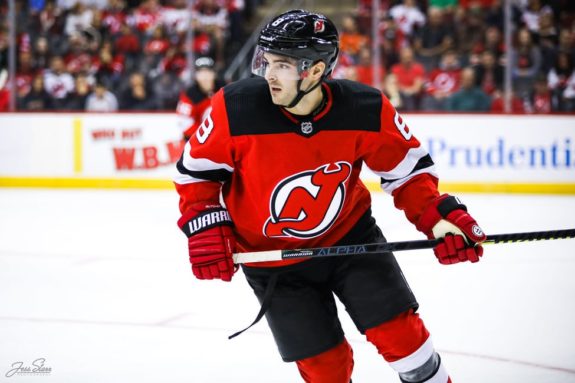
Overall, there should be quite a few players who benefit from Ruff. One of the Devils’ most significant issues in 2019-20 was they were playing a system not tailored to their roster’s strengths. That isn’t going to be the case anymore. They might not have a ton of size, but there are more than a few fast and skilled forwards who should thrive in the new system. They may need more puck-moving defensemen, but Butcher and Subban are good candidates to benefit from the change. If they can get stronger performances from them, coupled with scoring spikes from Hischier and Hughes, then they could be a competitive team as soon as 2020-21.
* * *
Advanced stats from Natural Stat Trick, Evolving Hockey